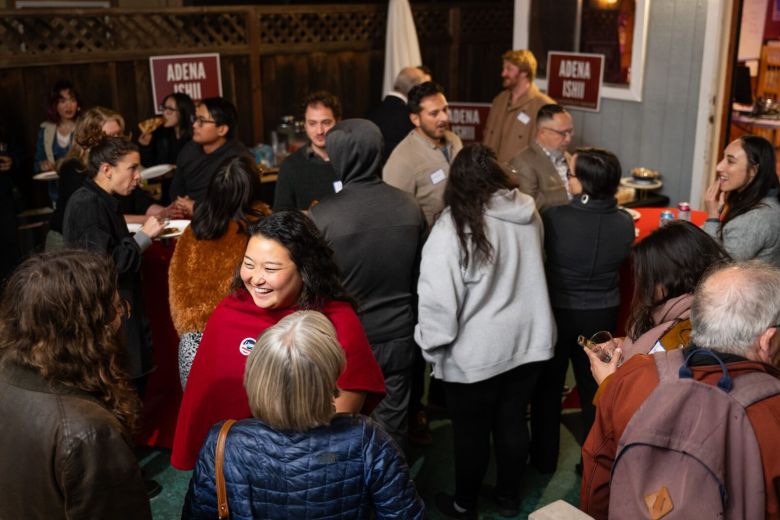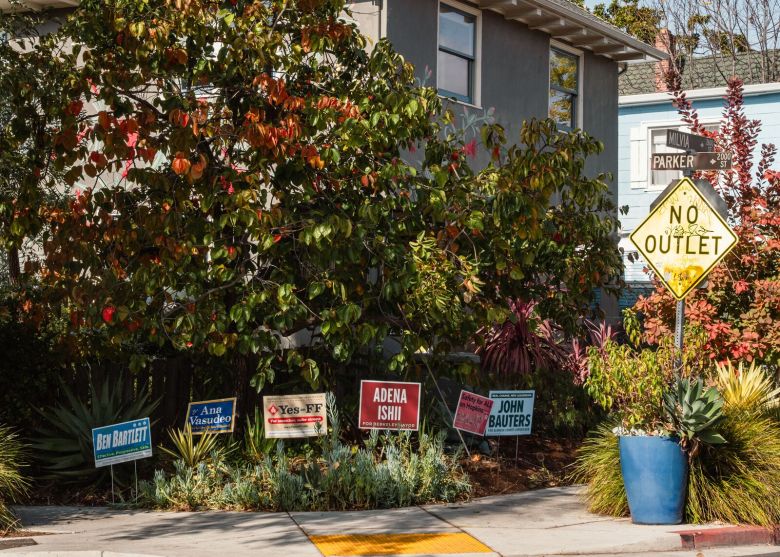 Adena Ishii holds Shohei, one of her three dogs named after Japanese baseball stars, as she waits for updated election results Wednesday with her campaign manager, Cydney Chilimidos, and volunteer Yumi Kobayashi. When the update arrived, it confirmed Ishii would become Berkeley’s next mayor. Credit: Ximena Natera, Berkeleyside/CatchLight Local
Adena Ishii holds Shohei, one of her three dogs named after Japanese baseball stars, as she waits for updated election results Wednesday with her campaign manager, Cydney Chilimidos, and volunteer Yumi Kobayashi. When the update arrived, it confirmed Ishii would become Berkeley’s next mayor. Credit: Ximena Natera, Berkeleyside/CatchLight Local
Adena Ishii and those around her always believed she could win the race for Berkeley mayor. But Ishii also knew plenty of people in city politics were skeptical, seeing her as a long-shot candidate who had never before run for office, was unknown to most voters and was going up against veterans of Berkeley politics.
“For people who didn’t know me, I knew that I was going to have to convince them that I was capable of doing it,” she said in an interview with Berkeleyside this week.
On Wednesday, a nearly final batch of results released by county officials confirmed Ishii had pulled off a major political upset, defeating two-term Councilmember Sophie Hahn 51.1% to 48.9% after ranked-choice votes were taken into account. Ishii also narrowly edged out Hahn in first-choice votes, with former Councilmember Kate Harrison well behind in third.
At 34, Ishii will become the first Asian American mayor in Berkeley’s history, as well as the first woman of color to hold the job. And she is more of a political outsider than anyone elected Berkeley mayor since the late 1970s, having not spent time on the City Council or in other public office.
It’s difficult to draw too many firm conclusions about why Ishii prevailed by just over 1,000 votes, and county election officials have not yet released detailed results showing how the candidates fared in different parts of the city.
But Ishii’s supporters point to two key turning points that contributed to her win: The chaotic weeks at the start of the year when both Harrison and Councilmember Rigel Robinson resigned from office, and the day in September when Ishii picked up endorsements from state Sen. Nancy Skinner and Asm. Buffy Wicks.
The support for Ishii from two popular state legislators “gave her campaign a lot of momentum,” said former councilmember Lori Droste, who also endorsed her.
“People really started to coalesce around Adena,” Droste said.
Both Hahn and Harrison, meanwhile, chalked up Ishii’s victory to an anti-incumbent sentiment that has swayed elections around the Bay Area and nationwide.
“I consider myself in very good company with some extraordinary candidates like Kamala Harris who were experienced, over-qualified, have an incredible record of success and ran pretty flawless campaigns,” Hahn told Berkeleyside. “But it’s just not what the electorate, anywhere in the country, seems to be buying right now.”
Ishii credited her campaign’s ground game, which visited more than 20,000 homes and put an emphasis on hearing what those voters wanted from their city government.
While the conventional political wisdom saw Hahn as the front-runner because of her advantages in fundraising and raft of City Hall endorsements, including from outgoing Mayor Jesse Arreguín and most of the council, Ishii said that view missed what was happening on the ground.
“They couldn’t see the individual conversations we were having with people, they weren’t watching us every single day knocking on doors,” she said. “[They] couldn’t see all the work we were putting into the campaign.”
From housing insecurity to the mayor’s office Adena Ishii and her campaign manager, Cydney Chilimidos, write thank-you cards to supporters. Credit: Ximena Natera, Berkeleyside/CatchLight Local
Adena Ishii and her campaign manager, Cydney Chilimidos, write thank-you cards to supporters. Credit: Ximena Natera, Berkeleyside/CatchLight Local
The first time Ishii set foot on the UC Berkeley campus as a high-schooler, it was clear to her that this was where she belonged.
“I just felt immediately connected,” she said, “and I knew that I wanted to move up here.”
Ishii spent most of her childhood in the Los Angeles County suburb Agoura Hills, the middle child of three daughters whose parents who worked in the film industry.
She moved to the city of her dreams in 2009, enrolling at Berkeley City College with a plan to transfer to UC Berkeley’s Haas School of Business. But she arrived in the middle of the Great Recession, when budget cuts made it difficult for her to meet with counsellors, get financial aid and enroll in the classes she needed. Her first political work grew out of that frustration, as she organized rallies in Sacramento for education funding.
Meanwhile, she grappled with the Bay Area’s rapidly worsening housing crisis. After leaving the high school boyfriend she’d moved to Berkeley with, who Ishii said had become abusive, she slept on friends’ couches, lived off the lease at a co-op and spent one summer sharing a small bedroom in a fraternity house with two other people. Eventually, she found the South Berkeley apartment that would be her home for more than a decade.
“That was the beginning of some more stability,” Ishii said, though she added, “I barely had enough to pay for rent.”
Settling into South Berkeley Supporters of Adena Ishii gather in her backyard on Election Night for a watch party. Initial results showed Councilmember Sophie Hahn leading the race for Berkeley mayor, but the trickle of results over the next two weeks showed Ishii won by just over 1,000 votes. Credit: Adahlia Cole
Supporters of Adena Ishii gather in her backyard on Election Night for a watch party. Initial results showed Councilmember Sophie Hahn leading the race for Berkeley mayor, but the trickle of results over the next two weeks showed Ishii won by just over 1,000 votes. Credit: Adahlia Cole
Ishii transferred to UC Berkeley and earned her business degree, then went on to work in the Alameda County District Attorney’s Office and get a law degree from Santa Clara University.
She did not enter the mayor’s race as a total newcomer to local politics — Ishii spent years working with the League of Women Voters Berkeley Albany Emeryville, where she rose to become the first woman of color to lead the chapter, and hosted forums with candidates for City Council and other offices. Ishii also worked on the commission that oversaw spending from Berkeley’s soda tax and the school district’s Reparations Task Force.
One day in 2015, when Ishii was doing odd jobs through the app Taskrabbit, she took a gig packaging samples for a Berkeley-based snack brand called Dang Foods and met the company’s co-founder, Andrew Kitirattragarn. Ishii and Kitirattragarn, who now works as a financial analyst after selling the company, married and adopted their daughter in 2020.
The couple bought a home in South Berkeley last year, where they live with their three dogs named for Japanese baseball stars: Ichiro, Matsui and Shohei. They moved around the time Ishii was starting to put her campaign for mayor together, so settling in has been a slow process — they still haven’t had time to buy carpets or hang art on the walls. And her schedule these days isn’t making that much easier, as Ishii assembles a staff and prepares to take office in City Hall.
Once she’s sworn in on Dec. 6, Ishii will go to work just around the corner from the Berkeley City College campus where she took classes 15 years ago in that difficult early chapter of her life in the city.
“There aren’t that many people who have that kind of background that end up becoming mayor,” she said. “It’s an opportunity to bring a voice to a lot of issues that we have here, and to really focus on solutions.”
Chaos in January turned the race toward Ishii Sophie Hahn (left), Kate Harrison and Adena Ishii take part in a candidate forum during the race for Berkeley mayor. Credit: Kelly Sullivan
Sophie Hahn (left), Kate Harrison and Adena Ishii take part in a candidate forum during the race for Berkeley mayor. Credit: Kelly Sullivan
The tumultuous start to the year in City Hall reshaped the mayor’s race in several key ways. Robinson, who had been running for mayor, shut down his campaign; Harrison stayed in the running.
Their resignations added to a perception that the council — which had already experienced months of protests from pro-Palestinian activists demanding the body pass a resolution calling for a cease-fire in Gaza — was mired in chaos and dysfunction. Ishii says she believes the council should pass a cease-fire resolution, though she did not make the issue a centerpiece of her campaign.
Precisely what was dysfunctional in city government, or who was responsible for the chaos, depended on who you asked. But Ishii’s campaign seized on the sense that something was going wrong, and pointed to her nonpartisan background to say she would “turn down the noise” and “reset” city politics.
“It created a really different situation and, I think, a clearer path forward,” Ishii said.
Robinson’s departure also meant “Yes In My Backyard” advocates, many of whom had backed his campaign and have long accused Hahn and Harrison of trying to block housing, were looking for someone to support. Ishii ran on a similar pro-density platform to Robinson, and picked up support from YIMBY groups in his absence.
Agnes Cho, a South Berkeley resident and housing policy advocate, said she supported Ishii because of her approach to housing. Stopping to talk with a reporter at the South Berkeley Farmer’s Market this week, Cho said she supports the shift in local politics that has seen the City Council go from fiercely fighting development to embracing new construction. And, while both Hahn and Harrison dismiss any suggestion they are anti-housing, Cho saw Ishii as the best candidate to keep Berkeley on its current course.
“I just didn’t trust that Sophie would continue that legacy and that trajectory,” Cho said.
As for Harrison, Cho was one of several voters who spoke to Berkeleyside who said her decision to resign from the council made her mayoral campaign a non-starter for them.
Campaign built momentum and consolidated support Adena Ishii started the race for mayor as a relative unknown for most voters, but picked up key endorsements that helped her consolidate support. Credit: Ximena Natera, Berkeleyside/CatchLight Local
Adena Ishii started the race for mayor as a relative unknown for most voters, but picked up key endorsements that helped her consolidate support. Credit: Ximena Natera, Berkeleyside/CatchLight Local
As the campaign went on, Ishii said, she got the sense that there were lots of voters who were “Adena-curious” and liked where she stood, but had questions about whether she was capable both of winning the mayor’s race and doing the job effectively.
That’s what made the backing from Skinner and Wicks critical.
“Nancy and Buffy giving a stamp of approval told people, ‘We can trust that this is real — a real person, a real candidate, that she can win.’” Ishii said. “That gave people the license to support me if they were on the fence.”
Skinner said in an interview that she decided to endorse Ishii after watching her performance at a candidate forum last summer, where her approach to housing and “the tone she set” were appealing to the outgoing state senator. She also saw an opening in a poll that circulated in local political circles showing both Hahn and Harrison had high unfavorability ratings among voters.
“Sophie [was] not inevitable,” Skinner said. “People had a desire to find an alternative.”
In addition to Wicks, Skinner and YIMBY groups, Ishii’s campaign also had the backing of key politically moderate organizations such as the Berkeley Democratic Club, where Droste is president, and picked up an endorsement from the East Bay Times in the campaign’s final days.
Did campaigns underestimate Ishii? Adena Ishii drives around Berkeley looking for her campaign signs in the days after the election. Berkeley requires campaigns to remove their signs or face a fine. Credit: Ximena Natera, Berkeleyside/CatchLight Local
Adena Ishii drives around Berkeley looking for her campaign signs in the days after the election. Berkeley requires campaigns to remove their signs or face a fine. Credit: Ximena Natera, Berkeleyside/CatchLight Local
As Election Day approached, there were still few outward signs of how much the race had tightened. Hahn said her campaign’s internal polling showed Ishii and Harrison were in a race for second place, with similar levels of support she described as “not that high.”
Outside of highlighting their own years of experience as councilmembers, which drew a contrast with Ishii’s background, Hahn and Harrison leveled little direct criticism at her. When the race went negative, the clashes tended to be between Harrison and Hahn.
That continued beyond the election — asked why the race turned out the way it did in an interview the day after she conceded, Hahn began, “I would attribute it primarily to the extremely negative campaign that Kate Harrison ran.”
Hahn pointed to several campaign emails and a mailer from Harrison that criticized Hahn’s work on the council. That became significant when the race came down to ranked-choice votes: Hahn could have overtaken Ishii, who held a lead of just 337 first-place votes, by picking up even a narrow majority of second-place votes from supporters of Harrison, whose voting record on the council Hahn called “virtually identical” to her own.
Instead, 54% of Harrison voters who picked a second choice went with Ishii, sealing her win.
Were voters looking for an outsider?
Harrison contends the Berkeley race was an echo of the mayoral contest across the bay in San Francisco, where political outsider Daniel Lurie unseated London Breed. In both cases, Harrison said in an interview, residents “decided to make a change.”
“People don’t accept a ‘reset’ from someone who’s been there,” she said.
Although Hahn was not running for re-election, she ran with an incumbent’s message that she had steered Berkeley in the right direction, the City Council was working well and her experience meant she would continue to offer steady leadership as mayor. But Ishii’s outsider status was part of her appeal for some.
“I just wanted to try somebody new,” said Judy Gonzalez-Massih, another Ishii voter, who added that Hahn was “too entrenched.”
Eric Panzer, who has worked on several Berkeley campaigns, questioned how widespread that attitude was. Panzer noted both of the incumbents who ran for re-election to the City Council, Ben Bartlett and Terry Taplin, won their races handily, while in two open races the candidates who were endorsed by the districts’ outgoing council members cruised to victory.
“The notion that there was a strong anti-incumbent sentiment in Berkeley just does not fit the data we have,” he said.
Panzer instead argued Hahn’s campaign faltered despite its advantages because of the “contentious relationships” she had in City Hall. Although Ishii herself shied away from directly criticizing Hahn during the campaign, several of her allies sought to raise concerns about how Hahn interacted with city staff behind the scenes, which they charged had contributed to a toxic atmosphere in government. (Berkeleyside reached out to several former staff members who interacted with Hahn during her time on the council; none agreed to speak with a reporter for a story.)
Hahn rejected the suggestion that she had acted inappropriately, calling it “an old, sexist trope that is leveled at smart, effective and successful women all the time.
“It’s the oldest trick in the book, and it’s incredibly sad to see people using it, and sad that people still fall for it,” she said.
There’s another reason to be skeptical that the anti-incumbent trend entirely explains Ishii’s victory: Unlike in San Francisco and Oakland, where efforts to oust sitting mayors argued each city was spiraling into chaos and mismanagement, Ishii’s campaign did not make the case that Berkeley needed a major shake-up. Instead, at a time of significant change in the city, Ishii’s message was that Berkeley is broadly on the right track — but its politics need a different way forward.
“It’s not that I was saying, ‘We’re totally going in the wrong direction, we need to completely start over and do things totally differently,’” she said. “It was about how we’re going about doing things — making sure that we’re hearing from people, that we’re giving people a voice, that we’re unifying the council.
“When we’re talking about ‘resetting,’ that’s what we’re talking about,” she added. “Less of a change of direction, generally, but more how we work with each other and how we interact with the constituents and the people who live here.”
“*” indicates required fields
